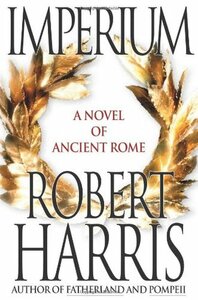Take a photo of a barcode or cover
emotional
tense
fast-paced
Plot or Character Driven:
A mix
Strong character development:
No
Loveable characters:
Yes
Diverse cast of characters:
No
Flaws of characters a main focus:
No
informative
medium-paced
Plot or Character Driven:
A mix
Strong character development:
No
Loveable characters:
Complicated
Diverse cast of characters:
No
Flaws of characters a main focus:
Yes
I don’t feel able to give this a rating. The prose itself was polished and engaging, and the pacing of the book was excellent, with tension spread throughout in a way that certainly kept me interested. However, I found the whole thing a bit... cold? It’s very much a biography of Cicero: Tiro, our narrator, barely has personal interactions with anyone else, and for me his relationship with Cicero was a little bit lacking. As for Cicero himself, I feel we’re never given any reason to root for him over others besides from “he’s the protagonist and Tiro tells us he’s brilliant.” I did enjoy Cicero’s relationships with his daughter, brother, cousin, and friend Atticus, which managed to lend him a little humanity.
The book was also strongly anti-Catilina, which kind of touched a nerve for me, but I suppose it’s necessary in such a pro-Cicero book. One thing Harris did absolutely nail for me was the character of Marcus Caelius Rufus: a debauched and arrogant youth who gets away with the things he does because of his charm and brilliance and who has a certain taste for danger. What little we saw of Harris’ Publius Clodius Pulcher intrigued me too.
Overall, the book probably deserves 4 stars. I just can’t bring myself to give that rating, because that’s what I gave most of [a:Steven Saylor|42919|Steven Saylor|https://images.gr-assets.com/authors/1394768071p2/42919.jpg]’s Roma Sub Rosa books, and I just enjoyed them so much more - they’ve stuck with me on an emotional level.
The book was also strongly anti-Catilina, which kind of touched a nerve for me, but I suppose it’s necessary in such a pro-Cicero book. One thing Harris did absolutely nail for me was the character of Marcus Caelius Rufus: a debauched and arrogant youth who gets away with the things he does because of his charm and brilliance and who has a certain taste for danger. What little we saw of Harris’ Publius Clodius Pulcher intrigued me too.
Overall, the book probably deserves 4 stars. I just can’t bring myself to give that rating, because that’s what I gave most of [a:Steven Saylor|42919|Steven Saylor|https://images.gr-assets.com/authors/1394768071p2/42919.jpg]’s Roma Sub Rosa books, and I just enjoyed them so much more - they’ve stuck with me on an emotional level.
informative
inspiring
medium-paced
Plot or Character Driven:
Character
Strong character development:
Yes
Loveable characters:
Yes
Diverse cast of characters:
No
Flaws of characters a main focus:
No
So many names…. And they all look alike….
informative
tense
medium-paced
Plot or Character Driven:
A mix
Strong character development:
Yes
Loveable characters:
Yes
Diverse cast of characters:
Complicated
Flaws of characters a main focus:
Yes
A thoroughly enjoyable and fascinating read. I have a passing interest in Roman history but this really brought alive the characters of Cicero and his secretary Tyro and explored the social and political systems of Ancient Rome in a wonderful, engaging way. The characterisation is brilliant, the writing very engaging and the plots, based on history, conjecture and speculation, are cleverly and brilliantly thought out. All in all a great book to begin the year on!
Pretty interesting perspective on Cicero, would have liked a bit more of the narrator’s personality to show through though.
In the first of his Cicero trilogy Robert Harris tells the story of Cicero through the eyes of his amanuensis and slave, Tiro. The events of the novel are well documented in history, but here Cicero's story is granted a kind of credibility that only well-written fiction is allowed. Rather than addressing the questions of subjectivity and interpretation that historical documents inevitably raise, the reader is free to believe Harris's wondrous conceit that Tiro was able to faithfully transcribe all of the conversations he heard in Cicero's company. Tiro's stenography is a fantastic ploy, and it works beautifully. Tiro is the perfectly objective witness: as a slave he is almost invisible to the story's insiders, and as Cicero's constant companion he never misses a thing. Harris is careful to leave his character undeveloped: Tiro is a sensitive cipher through whom all matters of importance pass untouched to the reader; he is at once both the least and most important person in the novel.
Aside from this ingenious device, I like the balanced way in which Harris portrays Cicero, though I suppose the device may be half the reason for this. Cicero is the hero of the story, so he gets a mostly positive treatment, with a few warts for verisimilitude. It isn't the literary feast of a Robert Graves, but a very enjoyable read nevertheless. I'm looking forward to the next installments in the series.
Aside from this ingenious device, I like the balanced way in which Harris portrays Cicero, though I suppose the device may be half the reason for this. Cicero is the hero of the story, so he gets a mostly positive treatment, with a few warts for verisimilitude. It isn't the literary feast of a Robert Graves, but a very enjoyable read nevertheless. I'm looking forward to the next installments in the series.




